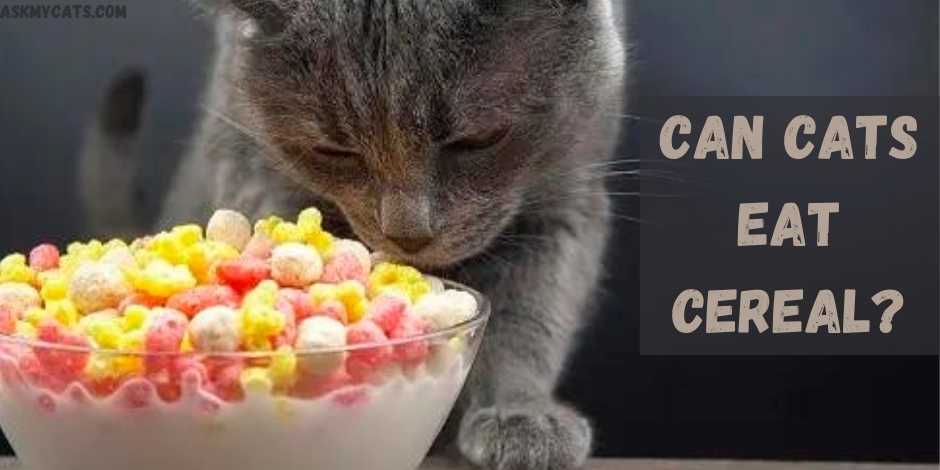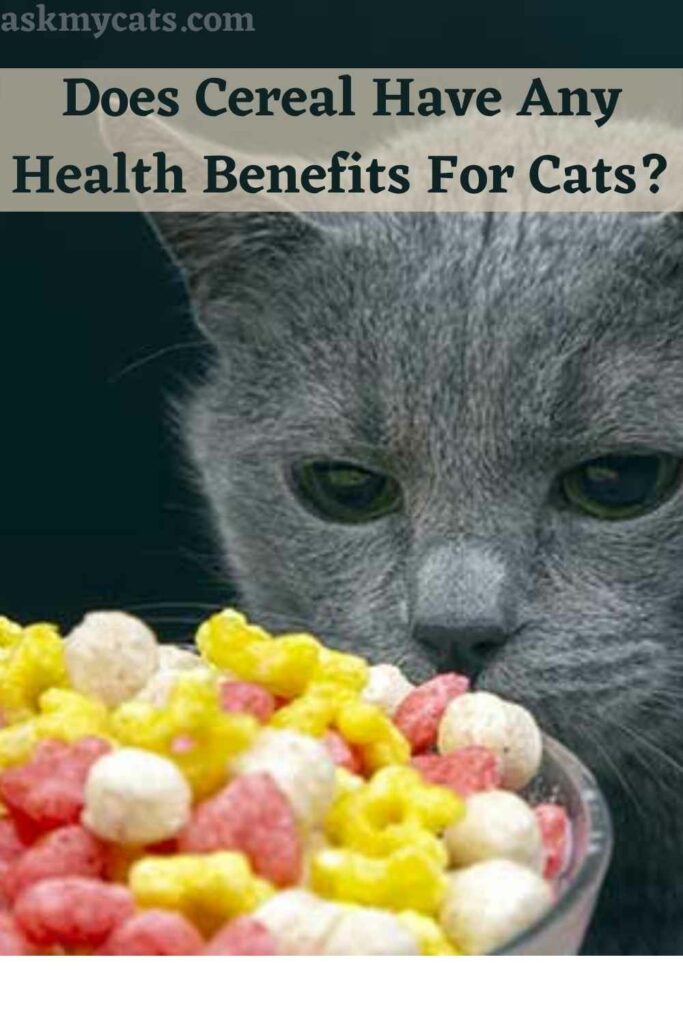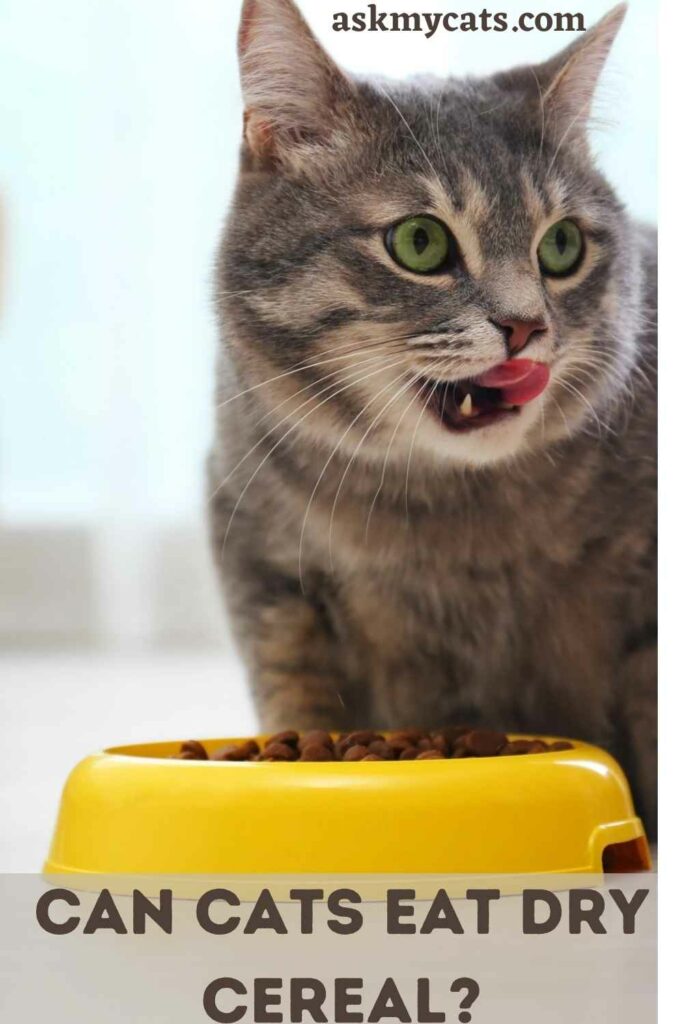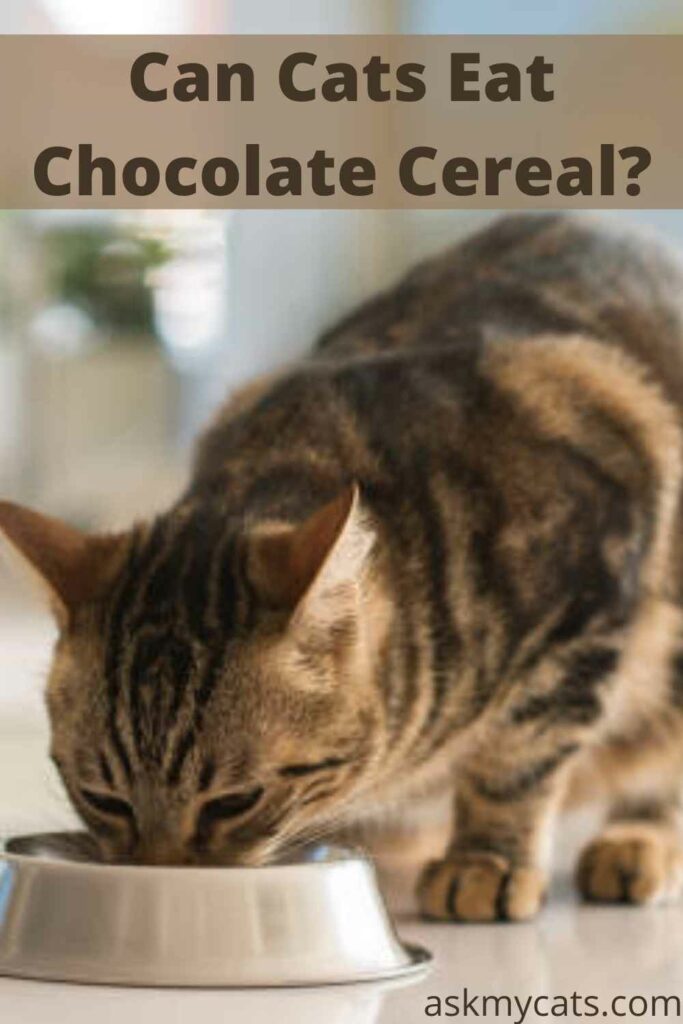Cereal is, obviously, one of the most popular morning dishes in many homes around the world. Cereals are well-known for their energizing characteristics. As a result, including cereal in your breakfast will guarantee that you have just the proper amount of energy to get through the day.
However, you might be wondering can your cat eat cereal?
Yes, cats can eat cereals. However, it is not recommended that you feed them any brand of cereal. Felines are obligate carnivores, which means that grains will provide no value to them.
This article will help to understand what type of cereals your cat can eat and what are the effects of your cat eating cereal.


Give Your Cat the Perfect Day
Get the Free Ebook!
Do Cat Needs Cereal?
No, cats do not need cereal as they are carnivores and have no need for it.
Cats’ digestive systems are built to function on a meat-based diet because they are obligate carnivores.
Cereal grains are utilized in some commercial cat meals to supply vitamins and minerals and are carefully combined with meat-based ingredients. The grains in your cereal will not provide any additional benefits to your cat.
Some cats are allergic to grains, therefore you should avoid giving them even a small bit of cereal because it can cause digestive problems like diarrhea or constipation.
Apart from that, you must use caution while interacting with felines because they are naturally intrigued about food. They’d like to try whatever their owner is consuming.
Is Cereal Safe For Cats?
Yes, cereal is safe for cats if fed in moderation, and should never be replaced by your cat’s staple diet.
Unless your cat is gluten or grain-sensitive, cereal contains no elements that can damage them.
While most cats may eat a modest quantity of cereal without harm, the cereal should not be used as a substitute for your cat’s regular meat-based food.
If you’ve been giving your cat cereal on a daily basis, as with any meal that your cat doesn’t ordinarily eat, it’s always advisable to get advice from your veterinarian.
Just because cereal is non-toxic and safe for cats doesn’t mean it’s a good idea to offer it to them.
Most cereals also have a lot of sugar in them. Cats don’t need this in their diets, and feeding it to them for an extended length of time might cause gastrointestinal problems, high blood sugar, and damage to your cat’s teeth.
Also, check out Can Cats Eat Cheerios?
Is Cereal Good/Bad For Cats?
Cereal is not good for cats as does not provide any nutrients that your cat requires to stay healthy.
People may be perplexed by the difference between good and safe. It is good if it has nutritional value, and it is safe if it is not poisonous.
Because grains include fiber, some people believe they are good for their digestive system. The fibers are too much for their digestive systems to handle.
To keep healthy, cats need more protein in their diet than fiber from whole grain-based products.
Cat owners believe that cats enjoy milk. As a result, cat owners believe that cereal mixed with a lot of milk is good for cats. Cats, on the other hand, lack the enzyme needed to digest the components in milk and grains.
It could harm your cat’s stomach and lead to a variety of problems in the long term. Milk is necessary for kitten growth, and they enjoy it as well.
Lactose intolerance is common in adult cats, and it can cause diarrhea and stomach pain. This is especially true when sugary cereals are mixed in with the milk.
Cereals can be bad for cats as it does not provide any nutritional value to them and can even have adverse effects on your cat’s health if not fed in moderation.
Any food that does not provide nourishment to cats is automatically bad. Cereals are human food and do not provide nutrients to cats.
They are high in processed and refined sugars, such as fructose, as well as carbs, which can be harmful to cats. This sugar is too much for a cat’s digestive system to handle. It can build up in a cat’s stomach, triggering vomiting and diarrhea.
Sugars can cause obesity, overweight, and even diabetes due to their high-calorie content. As a result, it cannot be used to replace feline food.
Cereals are also high in chocolate and other ingredients that are harmful to a cat’s health. Chocolate can cause diarrhea, and vomiting, and make you urinate more frequently.
It can induce hyperactivity, heart tremors, and other symptoms in severe situations. This is why sugary and chocolatey cereals are not suggested at all.
Check out more details about Can Cats Eat Wheat? Is Wheat Bad For Cats?
Does Cereal Have Any Health Benefits For Cats?
Yes, cereals can have some health benefits for your cat but only if the grains are unprocessed and unrefined.

Whole grains are used in most breakfast cereals, and if the grains are unprocessed and unrefined, they include a variety of vitamins and minerals. Fiber is worth mentioning.
Cats, while being obligate carnivores, require a little amount of fiber in their diets.
That’s why you may have occasionally spotted your kitty companion chewing on grass blades in your backyard.
Dietary fiber serves a variety of functions in your cat’s body.
To begin with, cereal feeds the animal’s gut-friendly microorganisms.
Gut-friendly bacteria are bacteria that live in the alimentary canal of your cat and help it digest food.
Second, dietary fiber bulks up the cat’s stool, which relieves constipation and makes bowel motions easier.
Dietary fiber is also recognized for making you feel fuller for extended periods of time. As a result, adding fiber-rich foods to your cat’s diet may help you reduce the amount of food your cat eats as a preventative strategy against weight gain.
Finally, the dietary fiber found in cereals may aid in the prevention of heart and cardiovascular disease.
Whole grains include several antioxidant and anti-inflammatory properties in addition to fiber. These substances protect your cat’s bodily cells from oxidative stress caused by free radicals.
As a result, they lower the cat’s risk of developing chronic diseases such as cancer, diabetes, and arthritis.
Finally, cereals may aid to improve your cat’s energy levels due to their high carbohydrate content. Carbohydrates usually compliment your cat’s regular food’s main energy sources, which are protein and lipids.
Can Kittens Eat Cereal?
Feeding cereal to your kitten must be avoided as they only require their mother’s cat milk and not anything else to become healthy.
“Can kittens eat baby cereal?” is a common question among new cat owners. Kittens remain to rely on their mother’s milk and do not require any solid food. They don’t have a well-developed digestive system.
As a result, feeding them cereals may cause them to choke to death because swallowing may be uncomfortable. Stick to the kitten’s prescribed diet at all times.
Also, check out can cats eat baby food
Can Cats Eat Dry Cereal?
Yes, cats can consume dry cereal. However, it is not recommended that you feed it to them because it might cause vomiting and stomachache if not given in moderation.

If you use dry cereal instead of milk, your lactose-intolerant cat may avoid having stomach pains or even vomiting.
Milk, on the other hand, isn’t an issue when it comes to cereal.
You’re already doing a fantastic job by not giving your cat milk, so why not forget cereal as well? There is no way to feed your cat cereal that is healthy.
Cereal, whether dry or with milk, contains ingredients that are harmful to your cat.
While the ingredients in cereal vary depending on the brand and variation, many of them contain carbohydrates.
People are divided on whether or not they should consume carbohydrates, although cats have already been proven to require a carbohydrate-free diet.
The enzymes required to break down carbohydrates are absent in cats’ bodies. Carbohydrates can be used as an energy source in humans, keeping us feeling full and energized, but not in cats.
Carbs will not be able to offer your cat energy or fuel. Your cat could eat and drink carbohydrates, but there will be a few benefits and many bad consequences.
Cereal carbohydrates and fiber have the potential to make kittens unwell in the long run. Consult your veterinarian for recommendations on the finest cat meals for weaning kittens.
Can Cats Eat Rice Cereal?
Yes, cats can eat rice cereal but only in small amounts as they contain a lot of sugar which is harmful to cats.
Rice cereals are fine for cats, but they should be wet to make swallowing easier. These grain-based products, on the other hand, provide no nutritious value.
They are not toxic to cats, which is good news. As a result, you should give them in limited amounts because they contain a lot of carbohydrates, which are bad for cats.
Refined carbohydrates and fiber have been shown to be harmful to your feline companion. As a result, always feed them animal protein-based foods.
Experts advise keeping human foods away from cats, no matter how delectable or sweet they are. This will encourage kittens to be raised healthily.
Is Honeycomb Cereal Safe For Cats?
No, honeycomb cereal is not safe for cats as it is very sugary which is harmful to your cat.
Honeycomb cereals are safe for cats to eat, but only in little amounts. Honeycombs contain a lot of sugar, which is not good for cats.
Cats’ stomachs become uncomfortable when they accumulate too much sugar in their bodies. Diarrhea and vomiting may be experienced by some felines.
Before feeding your cat anything new, it’s a good idea to obtain advice from a competent veterinarian.
Furthermore, because felines are obligate carnivores, make sure their diet is high in animal proteins rather than grain-based foods.
Can Cats Eat Chocolate Cereal?
No, cats must not eat chocolate cereal as it is toxic to them.

One of the human meals that are very hazardous to pets is chocolate.
Artificial sweeteners are widely used in chocolate. Excess sweets can irritate your cat’s stomach while also wreaking havoc on the animal’s blood sugar levels.
Theobromine is a component in chocolate that is extremely harmful to pets. It is digested in the human body spontaneously.
Chocolate-flavored artificial sweeteners hurt the cat’s stomach while also causing havoc with the animal’s blood sugar levels.
White chocolate has less theobromine than dark and bitter chocolate.
This could result in chocolate poisoning. You can check them out by looking for the following signs:
- Restlessness
- Diarrhea
- Increased breathing rate
- Increased heart rate
- Increased body temperature
- Vomiting and muscle rigidity
Frequently Asked Questions
Can cats eat cereal and milk?
No, giving your cat cereal and milk should be avoided as your cat’s gastrointestinal upset may be caused by the combination of cereal and milk in his or her diet. Cereal isn’t a necessary part of a cat’s diet because it isn’t a complete meal. Furthermore, most cats are lactose intolerant.
Can cats eat flaxseed cereal?
Yes, cats can eat flaxseed cereal. A cat can eat ground flaxseed. It contains a lot of dietary fiber and omega-3 fatty acids. Flaxseed has three key nutritional benefits for cats: glossy coats, a stronger immune system, and better digestion. However, it is preferable to feed your cat the right cat meals available, as this will be the best option.
Can cats eat cereal bars?
Granola bars can be eaten by a cat, but as a cat owner, you should avoid them entirely. It produces gastrointestinal distress as well as allergic reactions. On National Granola Bar Day, the Whole Grain Council also stated that granola bars are unhealthy and potentially deadly for cats.
Final Words
Cereals are safe for cats, but they aren’t good for them. Cats are obligate carnivores, meaning they must eat animal proteins to survive.
Cereals, on the other hand, are permissible for cats. Because they contain a lot of refined sugars, which can cause diarrhea and other stomach upset issues, this should be done in moderation.
Also, grain-based meals such as cereals should not be used to supplement a feline’s diet. These meals do not provide them with any nutritional value.
Overall, avoid adding human foods into their diet and stick to feline diets.
For any other unanswered questions, feel free to ask us in the comments section.
